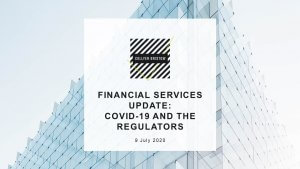- Banking & financial disputes
- Financial services

Longer Reads
Practical guidance for dealing with a Regulatory Decisions Committee action
3 minute read
Published 17 March 2020
Key information
This article sets out some guidance for any firm which finds itself on the wrong end of a Regulatory Decisions Committee (RDC) action, focusing on practical steps a firm can take to ensure the optimal outcome in this challenging situation. A previous article provided guidance on dealing with the initial stages of a Financial Conduct Authority (FCA) investigation, looking at the steps from the receipt of a s170 notice up to the FCA’s recommendation to the RDC.
Step 1 – The warning notice
The RDC is an FCA committee which makes the decision about whether to commence a formal disciplinary process for an alleged regulatory breach. While the RDC forms part of the FCA, it is considered separate from the investigations department.
Following the FCA investigation, the regulator will determine whether to take further action or whether it will refer the matter to the RDC. If the RDC receives a referral from the investigators and decides that is appropriate to proceed, the RDC will send a warning notice to the firm. The warning notice will set out the penalty sought, the reasons for the action and the firm’s right of access to the material upon
which the FCA relied in reaching its decision.
Practical tips:
Time limit for representations: The firm should assess the time limit provided in the warning notice (it must be at least 14 days) and, if it cannot be met, apply for an extension as soon as possible, giving reasons why it is necessary.
Access to material: The right of access to the FCA’s material will normally apply. When the material is received, the firm should examine it carefully to form a view of how the FCA has come to its decision. This will also be crucial for the representations (see step 2). If the FCA is relying on an exception to withhold its material (e.g., public interest) the firm should ensure the FCA has given adequate reasons.
Publicity: The FCA will normally publish a statement when the warning notice is issued, and it will normally identify the firm. The firm should consider whether it needs to engage a PR consultant to deal appropriately with the wider exposure.
Settlement: It is open to the firm to seek to settle at any time. The discount available to the firm reduces as the enforcement process progresses. Early engagement with legal advisers is crucial, to ensure the maximum benefit from settlement. A final notice (step 4) is still issued, but the firm and its legal advisers can negotiate the wording to portray the firm in the best possible light.
Step 2 – Representations to the RDC
The firm may make written and/or oral representations to the RDC. An oral hearing will only be available if requested, or the matter will simply be dealt with on the basis of written submissions.
Practical tips:
Oral or written? The firm should always give written, detailed representations but it can be beneficial to organise a meeting with the RDC to provide oral representations in addition. This will ensure the firm emphasises the main points and responds to the RDC’s questions in person.
Attendees at the oral representation: If oral representations are to be made, the firm will attend a meeting at the RDC. Relevant senior personnel and legal representatives should attend, but the firm should consider whether the oral representation should come from senior personnel, on behalf of the firm, as this may be seen more favourably by the RDC.
Step 3 – The decision notice
After expiry of the period for making representations, the RDC has a “reasonable period” in which to decide whether or not to issue a decision notice. If the decision notice is issued, it must give the FCA’s reasons for deciding to take action. The FCA will decide on a case-by-case basis whether to publish information in the decision notice.
Practical tips:
Challenging the RDC decision: This can be done by referring the matter to the Upper Tribunal. The firm only has 28 days from the decision notice to do this and so it will be important to move quickly. The decision notice will provide the procedure for making such a reference. If this is done, the FCA will normally publish the decision notice.
Step 4 – Referral to the Upper Tribunal
This is not technically an “appeal”, as a hearing at the Upper Tribunal is a complete re-hearing of the matters in issue. This is a judicial process and not a regulatory process like the RDC, so there will be evidence, including oral evidence and cross-examination of witnesses.
Practical tips:
Is it worth it? This will depend on the sanction imposed by the RDC and the strength of the firm’s case. If there is evidence of a clear mishandling of the case by the FCA, this would be a strong ground for a referral.
Appeal rights: It is possible, with permission from the Upper Tribunal, or from the Court of Appeal, to appeal from the decision. An appeal is available only in relation to a point of law.
Step 4 – Final notice
Following the 28-day period from the issuing of the decision notice, the FCA must give a final notice to the firm. The final notice sets out the orders and penalties and gives the date on which these are to come into effect. The FCA can impose two types of formal disciplinary sanctions: (1) public statements/censure; (2) financial penalties. The FCA is not, however, bound to take formal disciplinary proceedings and it may decide to take remedial measures short of formal disciplinary action, for example, by issuing a private warning or requiring a firm to make restitution to investors.
Practical tips:
Compliance: The firm should pay attention to the deadlines for compliance. Financial penalties normally have a 14-day deadline.
Be prepared
When the FCA takes the unwelcome step of referring a matter to the RDC, compliance teams need to be prepared to deal with the various processes involved having regard to the tight time limits. Early engagement with the firm’s legal advisers in particular, to seek advice on initiating settlement discussions, will be important to help ensure the firm is placed in the best possible position at the end of the regulatory road.
This article was originally published by Thomson Reuters in March 2020.
Related content
Longer Reads
Practical guidance for dealing with a Regulatory Decisions Committee action
Published 17 March 2020
Associated sectors / services
This article sets out some guidance for any firm which finds itself on the wrong end of a Regulatory Decisions Committee (RDC) action, focusing on practical steps a firm can take to ensure the optimal outcome in this challenging situation. A previous article provided guidance on dealing with the initial stages of a Financial Conduct Authority (FCA) investigation, looking at the steps from the receipt of a s170 notice up to the FCA’s recommendation to the RDC.
Step 1 – The warning notice
The RDC is an FCA committee which makes the decision about whether to commence a formal disciplinary process for an alleged regulatory breach. While the RDC forms part of the FCA, it is considered separate from the investigations department.
Following the FCA investigation, the regulator will determine whether to take further action or whether it will refer the matter to the RDC. If the RDC receives a referral from the investigators and decides that is appropriate to proceed, the RDC will send a warning notice to the firm. The warning notice will set out the penalty sought, the reasons for the action and the firm’s right of access to the material upon
which the FCA relied in reaching its decision.
Practical tips:
Time limit for representations: The firm should assess the time limit provided in the warning notice (it must be at least 14 days) and, if it cannot be met, apply for an extension as soon as possible, giving reasons why it is necessary.
Access to material: The right of access to the FCA’s material will normally apply. When the material is received, the firm should examine it carefully to form a view of how the FCA has come to its decision. This will also be crucial for the representations (see step 2). If the FCA is relying on an exception to withhold its material (e.g., public interest) the firm should ensure the FCA has given adequate reasons.
Publicity: The FCA will normally publish a statement when the warning notice is issued, and it will normally identify the firm. The firm should consider whether it needs to engage a PR consultant to deal appropriately with the wider exposure.
Settlement: It is open to the firm to seek to settle at any time. The discount available to the firm reduces as the enforcement process progresses. Early engagement with legal advisers is crucial, to ensure the maximum benefit from settlement. A final notice (step 4) is still issued, but the firm and its legal advisers can negotiate the wording to portray the firm in the best possible light.
Step 2 – Representations to the RDC
The firm may make written and/or oral representations to the RDC. An oral hearing will only be available if requested, or the matter will simply be dealt with on the basis of written submissions.
Practical tips:
Oral or written? The firm should always give written, detailed representations but it can be beneficial to organise a meeting with the RDC to provide oral representations in addition. This will ensure the firm emphasises the main points and responds to the RDC’s questions in person.
Attendees at the oral representation: If oral representations are to be made, the firm will attend a meeting at the RDC. Relevant senior personnel and legal representatives should attend, but the firm should consider whether the oral representation should come from senior personnel, on behalf of the firm, as this may be seen more favourably by the RDC.
Step 3 – The decision notice
After expiry of the period for making representations, the RDC has a “reasonable period” in which to decide whether or not to issue a decision notice. If the decision notice is issued, it must give the FCA’s reasons for deciding to take action. The FCA will decide on a case-by-case basis whether to publish information in the decision notice.
Practical tips:
Challenging the RDC decision: This can be done by referring the matter to the Upper Tribunal. The firm only has 28 days from the decision notice to do this and so it will be important to move quickly. The decision notice will provide the procedure for making such a reference. If this is done, the FCA will normally publish the decision notice.
Step 4 – Referral to the Upper Tribunal
This is not technically an “appeal”, as a hearing at the Upper Tribunal is a complete re-hearing of the matters in issue. This is a judicial process and not a regulatory process like the RDC, so there will be evidence, including oral evidence and cross-examination of witnesses.
Practical tips:
Is it worth it? This will depend on the sanction imposed by the RDC and the strength of the firm’s case. If there is evidence of a clear mishandling of the case by the FCA, this would be a strong ground for a referral.
Appeal rights: It is possible, with permission from the Upper Tribunal, or from the Court of Appeal, to appeal from the decision. An appeal is available only in relation to a point of law.
Step 4 – Final notice
Following the 28-day period from the issuing of the decision notice, the FCA must give a final notice to the firm. The final notice sets out the orders and penalties and gives the date on which these are to come into effect. The FCA can impose two types of formal disciplinary sanctions: (1) public statements/censure; (2) financial penalties. The FCA is not, however, bound to take formal disciplinary proceedings and it may decide to take remedial measures short of formal disciplinary action, for example, by issuing a private warning or requiring a firm to make restitution to investors.
Practical tips:
Compliance: The firm should pay attention to the deadlines for compliance. Financial penalties normally have a 14-day deadline.
Be prepared
When the FCA takes the unwelcome step of referring a matter to the RDC, compliance teams need to be prepared to deal with the various processes involved having regard to the tight time limits. Early engagement with the firm’s legal advisers in particular, to seek advice on initiating settlement discussions, will be important to help ensure the firm is placed in the best possible position at the end of the regulatory road.
This article was originally published by Thomson Reuters in March 2020.
Associated sectors / services
- Banking & financial disputes
- Financial services
Need some more information? Make an enquiry below.
Enjoy reading our articles? why not subscribe to notifications so you’ll never miss one?
Subscribe to our articlesMessage us on WhatsApp (calling not available)
Please note that Collyer Bristow provides this service during office hours for general information and enquiries only and that no legal or other professional advice will be provided over the WhatsApp platform. Please also note that if you choose to use this platform your personal data is likely to be processed outside the UK and EEA, including in the US. Appropriate legal or other professional opinion should be taken before taking or omitting to take any action in respect of any specific problem. Collyer Bristow LLP accepts no liability for any loss or damage which may arise from reliance on information provided. All information will be deleted immediately upon completion of a conversation.
Close








































































